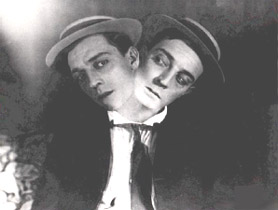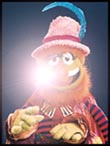 Sherlock Jr. (1924) Having not seen many of Buster Keaton's films, I can't say whether this one is his "best," though I don't expect to encounter one I like nearly as much. It's just an absolute delight, endlessly imaginitive, assured, and forward-thinking. It's so ahead of its time that most of its extremely clever sight gags still provoke unexpected belly laughs in the post-Airplane! world. As without Chaplin we would not have sweet 'n' comforting Hollywood romantic comedies, without Buster Keaton we would not have subtlely hilarious physical comedy. There would be no John Cleese, no Johnny Depp, no Lindsay Lohan. The story involves theater-projectionist Keaton trying to woo his sweetie-pie, only to be framed for the theft of a pocket-watch by his nefarious rival. He sets out to clear his name by following the instructions in a book about how to be a detective. When this fails, he resigns himself to defeat and returns to his job, where he falls asleep as the reels spin, tumbling into a dream in which he enters the movie and, casting himself as a master detective, solves the mystery and gets the girl. This is, of course, a simple structure on which to hang a series of hilarious set-pieces, including a few astounding visual jokes: Keaton riding on the handlebars of a careening bicycle, Keaton jumping through a window and emerging in full drag, Keaton jumping through his assistant's stomach (I still haven't figured out how they did that one). The centerpiece of the film is a mind-blowing sequence wherein Keaton walks from the floor of the movie theater into the film, and then reacts to the changes in backdrop, which get increasingly ridiculous and dangerous. It's amazing shit, and aside from a couple of quaintly antiquated effects, it's as immediate as it was 80 years ago.
His deadpan reactions to everything that occurs are laugh-out-loud funny, even when he's doing something as simple as trying to get a paper unstuck from his shoe. And there's some real heart to it as well, not in the melodramatic Chaplin style, but in the lovable-underdog way—when he gets the girl, you feel it, and yet it also stays funny. The honesty of the emotion and the bold inventiveness of the imagination keep Keaton's movies from seeming like something you have to sit through. And once you've seen him in action, suddenly a huge number of people whom you previously thought to be hilariously funny seem like tedious rip-offs of the master. This means YOU, Laurie Metcalf! The print on the DVD is good, though the score (performed by the Club Foot Orchestra) gets a bit tonge-in-cheek for my tastes. The best way to see Sherlock Jr.—or any silent film, for that matter—is at a theatre, with live piano accompaniment and an audience of fans laughing their asses off. But since you'd be lucky to happen into that scenario and would more likely have to watch it at home, I'd recommend shutting off the sound and synching the film up with a well-chosen CD, like something by Adam Ant or King Diamond.
Review by La Fée |

